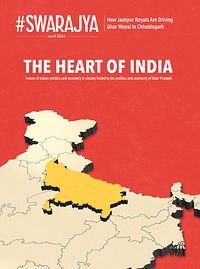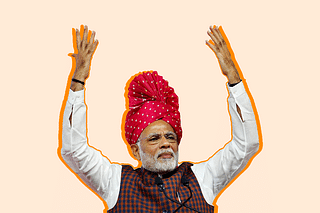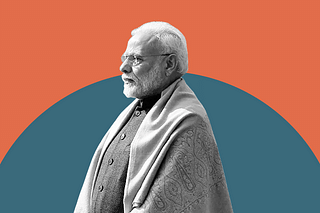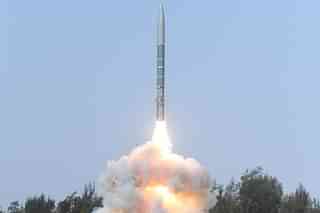Magazine
Sustainability And Tagore
Sanjoy Mukherjee
May 10, 2016, 11:43 AM | Updated 11:43 AM IST
Save & read from anywhere!
Bookmark stories for easy access on any device or the Swarajya app.

Ecological sustainability cannot be a movement without sensitivity towards the Spirit, as in esprit de corps. The Latin root Spiritus means breath. There is a breath of life eternal in the glow of the sun, the flow of the water, the blowing of the wind and dancing of the leaves and birds. Are we ready to perceive these movements of Nature that also keep us alive?
Rabindranath Tagore could fathom these vibrations as evident from all his creative masterpieces. Mukktadhara (Free Flow) is a play by Tagore where one finds the human protest bold and clear against mindless dam construction that arrests the natural flow of the river for power and control on others, including Nature. Abhijit, the protagonist of alternative voice, finally laid down his body and life in the gushing waters of the dam to protest against this inhuman act of exploitation of Nature and the human spirit of free flowing natural life.
We have lent silent ears to the wisdom of the poet. And what are the consequences?
In the hills of Uttarakhand in India are many places of pilgrimage including Kedarnath and Badrinath. Devotees from all over the country and elsewhere have been flocking to these age-old shrines for spiritual solace and sublimation for thousands of years. For centuries, pilgrims would sustain all hardships to reach these places mostly on foot. They would chant hymns in glory of Lord Shiva on the way up the hills. It is indeed an awesome sight.
And then one day it happened, just a few years ago. One still has terrible memories of that catastrophe. It was peak pilgrimage season. And calamity struck. Never before in the recent history of this land did clouds burst and floods hit all over the region with such fury. Official figures said that the death toll was 6,000, while media reported that the figure crossed 10,000.
Untold misery befell the families afflicted. Many corpses were recovered only months later. But the question is: Why did it all happen?
Mindless construction of buildings and dams had been going on in this region for long in the name of progress and development. The lure of lucre and power prompted the business and political elite to flout all basic norms of ecological sustainability to grab quick bucks, taking advantage of the common Indian quest for religion and spirituality. Conscientious experts and critics strongly suggested that this disaster was man-made! The self-sustaining resources of Nature were being ravaged to cater to the greed of man to such an extreme that finally the blow came back. Where then are we heading in the name of progress and development?
In our mind’s eye we can visualize another scene. This time it was in Germany on the bank of the river Rhine. The entire village had assembled to watch the installation of a hydro-electric plant. All around there was the mood of celebration. The power generated from the plant would not only be an example of a technological marvel but also be of great economic and civic utility to the entire village community. On the bank of the river a little away from the scene of merriment was sitting the philosopher Martin Heidegger. His mood was one of remorse. One could see the worry in his eyebrows and wrinkles all over his forehead. A passer-by asked why he was not participating in the grand celebration ceremony. Heidegger was silent. His eyes were painfully watching the turbine blades striking and churning the waters. One could then hear his murmur of lament that was powerful and poignant:
In his famous play Raktakorabi (Red Oleanders), Tagore portrays an atrocious king, the owner of a mine, as an engine of exploitation and mechanization reminiscent of Chaplin’s Modern Times. Then, the child of nature, Nandini makes her lively advent into the kingdom with her love, freedom and spontaneity. People could feel and sense their fetters as in the machine and learnt to sing and dance in celebration of life—Nandini’s worship (puja). But the symbol of power and authority, the royal flag (dhwaja) was still standing in the way. The grand finale was reached when the king himself broke down his flagpost to join the celebration of Nandini. The crux of sustainable self and life is in this ability to challenge and demolish one’s archaic beliefs and values that devours the life natural!
Any teacher or learner of substance and eminence will ever be willing to challenge the self. The roots of sustainability lie in our Self. It depends on whether we are bold enough to raise the deeper and critical questions about the way we think and live. Otherwise, the system of learning becomes ossified and fossilized with heat and dust around, but no Light! Sadly enough, the Little Prince lamented: “Grown-ups are like that!”
Tagore was admitted to six schools but could not ‘sustain’ any of them even for a few days as the education was structured, monotonous and lifeless! Finally at the age of 40, he created a university at Shantiniketan in the heart of nature far from the humdrum of city life of Calcutta. He christened it Vishwa Bharati, Global India. The poet could listen to the call of the wilderness for sustainability and spiritual transformation. In his play Achalayatan (The Stagnant Chamber) the poet portrays the worst possible predicament we witness in modern education. But he also gave the clarion call to freedom:
In order to respond to the call of Nature, we need to create space for silence and solitude amidst the blast and speed of modern life. Spirit can be awakened, sensitivity can be revived only in the heart of silence when we learn to see and listen properly, feel nobly and love abundantly. In his touching masterpiece Dakghar (The Post Office), we find the young Amol, a terminal patient, observing and listening to Nature from his deathbed in a way that the ordinary mortal cannot as we take things for granted and do not care to look at them deeply and differently. Amol’s realization comes as a death knell to all experts, icons of lifeless scholarship and champions of structured and mechanized modern education: “I don’t want to become a pundit...” Amol perceived life from the throes of death in his moments of poignant silence! Before his death, Amol recorded his alternative voice as letters to the king of the land that never received any response for which he waited till his last.
The drama of life and the dance of death. This play would be enacted by the Jews in the translated version on the eve of their ‘Day of Judgment’ in the fire and furnace of Auschwitz! They would perform the play before they would face their inhuman ordeal to gather strength to face the stark brutal reality. When human suffering surpasses all our wildest imagination, culture in its all-pervading and universal form comes as our soul mate, crossing all borders of space and time. The agony of one Amol merges with the oceanic inferno of the sufferings of an entire race.
Six million Jews were killed in the worst ever human massacre. The philosopher Theodore Adorno wrote: “After Auschwitz it is pointless to write poetry.” But we still write poetry!
This article was published in the May 2016 Issue of Swarajya Magazine. To subscribe, click here.
The author is a Faculty of Business Ethics and Corporate Social Responsibility at IIM Shillong. He has been invited to speak at several prestigious forums—the Aspen Institute, the Oxford Roundtable, the Global Ethics Forum (Geneva), and International Wisdom Conference at CEIBS, Shanghai, among many others. At IIM Shillong, he is the Chairperson of the Annual International Conference on Sustainability.
Save & read from anywhere!
Bookmark stories for easy access on any device or the Swarajya app.
Sanjoy Mukherjee teaches Business Ethics and Corporate Social Responsibility at IIM Shillong.
Introducing ElectionsHQ + 50 Ground Reports Project
The 2024 elections might seem easy to guess, but there are some important questions that shouldn't be missed.
Do freebies still sway voters? Do people prioritise infrastructure when voting? How will Punjab vote?
The answers to these questions provide great insights into where we, as a country, are headed in the years to come.
Swarajya is starting a project with an aim to do 50 solid ground stories and a smart commentary service on WhatsApp, a one-of-a-kind. We'd love your support during this election season.
Click below to contribute.





